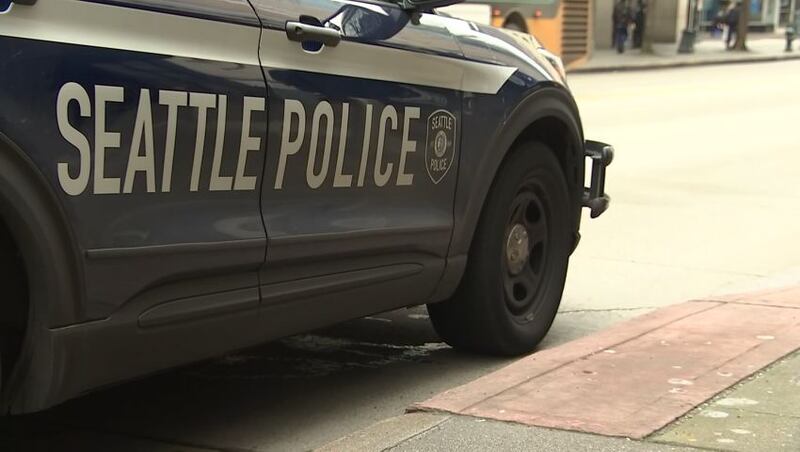SEATTLE, Wash. — The Seattle Police Department is working to tackle a dramatic increase in crime while dealing with a shortage of hundreds of officers.
Police Chief Adrian Diaz laid out a new 2022 SPD Strategic Plan on Monday to the Seattle City Council Public Safety and Human Services committee.
Part of the plan to recruit more staff includes offering incentives that aren’t provided by other police departments. It includes changes like bringing on emotional support dogs after a critical incident, having mental health providers on contract, and even offering wellness and nutrition assistance.
A big perk that the police department is currently working on with the Seattle Police Officers Guild (SPOG) is three-day weekends for officers, with no mandatory overtime.
“I don’t think anyone has seen anything like we’ve seen over the last couple of years,” Diaz said. “We know morale can be low when they’re not appreciated, so we’re spending a lot of time on finding a schedule and shift that gets people the wellness they need,” Diaz said.
The new shift would have officers work four 10-hour days. Diaz says currently, officers are working two or three extra shifts every week.
Scroll down to continue reading
More news from KIRO 7
- Seattle Starbucks store votes to unionize, becomes first on West Coast
- Lynnwood man wins largest slot machine jackpot in state history
- Gary Hartman sentenced in 1986 Pierce County murder
- Do you have an investigative story tip? Send us an email at investigate@kiro7.com
“The whole goal is for wellness and people get time off,” he said. “More recovery time makes it much more competitive, not only for our officers but with other jurisdictions,” Diaz said.
After a question about recruiting bonuses from Councilmember Sara Nelson, the police chief acknowledged that recruiting officers has been more difficult after the city eliminated hiring bonuses in February. The change happened after communications and legal confusion between former Mayor Jenny Durkan, Seattle City Council and Mayor Bruce Harrell’s office. It led to the department promoting a $10,000 new-hire and $25,000 lateral-hire bonus incentive in January. Then the incentive was canceled in February.
“Was there an uptick in interest when it was announced?” Nelson asked.
“In January we actually had our highest signup since 2020. And in March we dropped dramatically to just six people signing up,” Diaz said. He said 17 lateral candidates signed up in January (Diaz did not mention how many of those candidates were hired, though KIRO7 previously reported five officers received the bonus). Of six candidates in March, Diaz said only one lateral candidate finished the testing process.
“If we’re trying to hire people and have good-quality candidates, having one lateral is not a good place to be in,” Diaz said.
Mayor Harrell’s office said Monday afternoon the city was currently assessing how effective the bonuses were, and that the report from Seattle Department of Human Resources would be done next week.
Harrell’s office said having enough police officers is a “top priority” and that bringing back bonuses was not off the table.
“The Mayor’s Office is currently working to develop an effective, sustainable, and comprehensive recruiting plan for new officers and lateral hires. We will continue to review and evaluate the data, as well as work with SPD and with the City Council to explore all potential strategies and options, including bonuses as one potential tool in that effort,” spokesperson Jamie Housen said in an email.
The 2022 SPD Strategic Plan also says the department will continue to work on reducing use of force. The report noted that use of force is currently down 28% compared to 2019 levels.
The presentation to City Council Monday said as early as next week, the police department will bring on a tool called the BolaWrap that KIRO7 first showed you in 2020.
It can stop a person fleeing without using a lethal weapon. Diaz said training plans are in place, but it is waiting for the company’s new, quieter model.
Councilmember Teresa Mosqueda also pointed to the importance of lowering call volumes for SPD officers, which is part of the plan.
“How we offload some of these jobs that are not necessary for officers to respond to will be a very important element of retention strategies,” Mosqueda said.
Diaz also said says the department is working toward a new model called “relational policing,” or relationship-based policing. All officers will get new training, from patrol to command staff.
“Kind of making every officer a generalist. Being able to build relationships in the community. Problem solving, and also having the skill set to handle an active-shooter situation,” Diaz said.
Despite ongoing staffing woes, the chief pointed to big changes at neighborhoods of Little Saigon at 12th and Jackson, and Third and Pine. Both neighborhoods had crowds that people described as open air-drug markets attracting violent crime, but the troubled areas have been cleared and maintained for nearly a month.
“We are seeing positive results when we all work together,” Diaz said. “I’m proud of what we’ve been able to accomplish,” he said.
©2022 Cox Media Group








